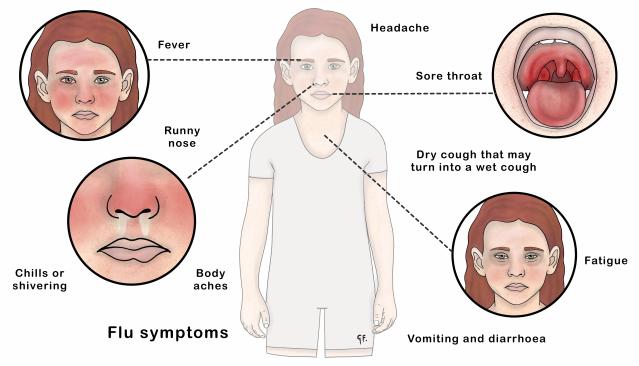Key points about the flu
- the flu (influenza) can be a serious viral infection
- it's not the same as having a bad cold
- even if your child is fit and healthy, they can easily catch the flu
- flu vaccination every year gives the best protection
- keep infected tamariki (children) away from others while they're unwell
What is the flu?
Influenza, usually called 'the flu', is an infection caused by the influenza virus. It affects the nose, throat, lungs and other parts of the body. It infects many people every year, mostly during the winter months in Aotearoa New Zealand. The flu can be a serious and sometimes life-threatening infection.
Symptoms of the flu

Flu in tamariki usually causes at least 2 or 3 of the following symptoms:
- a fever that starts suddenly (a temperature more than 38 degrees Celsius)
- body aches or pains
- headache
- dry cough which may become moist
- sore throat
- low energy or fatigue
- chills or shivering
- runny or stuffy nose
- upset tummy, vomiting or diarrhoea
- a rash
Sometimes people confuse a cold with the flu. But with the flu, people are usually more unwell and flu symptoms may last longer.
Occasionally, flu can cause serious illness. The flu can be more serious in tamariki who also have a long-lasting (chronic) disease.
How the flu virus spreads
The flu virus is very easy to catch and can affect anyone.
It can spread easily by coughing, sneezing and touching contaminated surfaces.
How to prevent your child from catching the flu
Flu vaccination every year
Other things you can do
You can reduce the risk of catching the flu by washing hands, covering coughs and sneezes, cleaning surfaces and staying away from others who are sick.
Wash hands
Make sure everyone in your whānau washes their hands often and thoroughly, including before preparing food and eating. Make sure everyone dries them well too. Soap and water for 20 seconds, then 20 seconds drying. Or use a hand sanitiser.
Cover coughs and sneezes
Remind your child to cough or sneeze into their elbow or cover their mouth and nose with tissues. Throw any tissues away as soon as possible. Remind your child to sanitise or wash their hands regularly.
See the page on teaching children to blow their nose for some tips.
Teaching Children To Blow Their Nose
Clean surfaces
Regularly clean surfaces in the bathroom and the kitchen.
Stay away from people who are sick
Keep away from people who are sick.
If your child becomes sick, keep them at home until they're better.
Managing the flu
Most tamariki fight off the infection by themselves.
Antibiotics are not helpful for the flu and a health professional won't prescribe them unless your child also has a bacterial infection.
Continue with your child's usual medicines (such as those for asthma, diabetes and epilepsy).
Caring for your child with the flu at home
If your child is miserable because of fever or aches and pains, you can give paracetamol to make them more comfortable. You must follow the dosage instructions on the bottle. It is dangerous to give more than the recommended dose.
Never give your child or young person aspirin as this may increase the risk of Reye syndrome, which is a rare and serious illness.
Give your child regular fluids.
Use saline drops to treat a stuffy nose - ask your pharmacist or health professional for instructions.
Keep your child at home and resting until they are well.
When to get medical help for your child with the flu
When to see a health professional
See a health professional if you think your child has the flu and:
- is less than 12 months old
- was born prematurely and is less than 2 years old
- has been in hospital within the last 3 months
- a long-lasting medical condition
When to see a health professional urgently
You should see a health professional urgently if you're worried or your child:
- is taking less than half of their normal feeds
- has fewer than 4 wet nappies in 24 hours
- is severely irritable and is not wanting to be held
- has trouble breathing, has noisy breathing or is breathing fast
- looks unwell
- has tummy pain, vomiting or diarrhoea and seems sicker than you would expect
- doesn't seem to be improving
Signs That Children Are Struggling To Breathe
When to call 111
Call 111 within Aotearoa New Zealand for urgent medical help (use the appropriate emergency number in other countries) if your child:
- is blue around the mouth
- has severe difficulty breathing
- has a worrying rash especially one that does not go away when you press on it
- is unconscious or you can't wake them up properly
Acknowledgements
Illustration by Dr Greta File. Property of KidsHealth.
